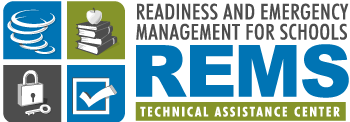|
Thank you for subscribing to the REMS TA Center mailing list. We view your subscription as a demonstration of your commitment to school and campus safety and emergency preparedness, and we applaud you. The end of another busy year is here, and we are reflecting on all the training, tools, and other resources that we created on high-quality emergency operations plan (EOP) development in 2024. We began the year with goals to engage new audiences, create more role-based resources, enhance our collaboration efforts, and address topics of high need. Thank you for contributing your feedback to us via email, surveys, and web forms so that we can continue to evolve our technical assistance services. Below are lists of NEW resources we released in 2024 that address various goals and priorities for the REMS TA Center.
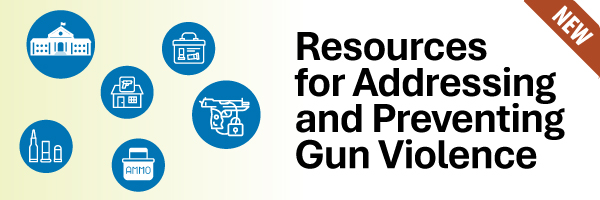
The REMS TA Center hosted a webinar series in partnership
with the U.S. Department of Education and National Center
on Safe Supportive Learning Environments on preventing and
addressing gun violence in schools. Each of the five events
were approximately 90 minutes in length and featured speakers
from the local, state, and national levels, many of whom had
survived incidents of gun violence. Topics covered in each webinar
included
school violence prevention,
how high-quality EOPs build school emergency preparedness capacity,
effectively responding to incidents of school violence,
navigating the road to recovery from school violence, and
youth and young adult experiences as school violence survivors and advocates.
Furthermore, the REMS TA Center released a
sample template letter
on safe firearm storage that is also available in Spanish. It is
intended for principals and school districts to customize and
disseminate to families, guardians, and caregivers to share
essential information about safe firearm storage.
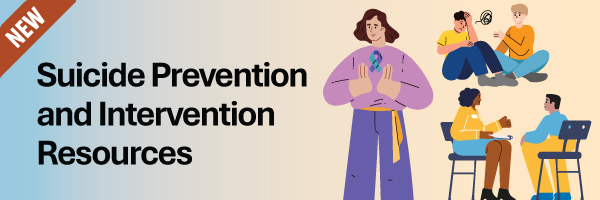
We developed resources on addressing the threat
of suicide in school communities through their EOP
and preparedness work. The REMS TA Center hosted a 60-minute
webinar on providing
suicide prevention and intervention
supports to students experiencing mental health crises. Presenters
from Connecticut discussed suicide prevention and
intervention initiatives currently being used locally and
statewide. In collaboration with the Substance Abuse and Mental
Health Services Administration and U.S. Department of Education, we
hosted a 90-minute webinar on how K-12 educators and educational
partners can use the
988 Suicide & Crisis Lifeline
to further
support their school communities.
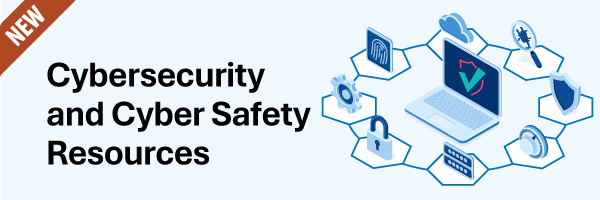
The REMS TA Center continues to prioritize cybersecurity
as a threat to address within EOPs. This year, we
released a new fact sheet on
Ransomware Attacks and the Importance of Collaboration in District-Level Cybersecurity Risk Management.
It guides administrators, educators, support staff, and information
technology (IT) staff through the prevention, response, and
recovery stages of a ransomware incident at the district
level. It also highlights tested strategies and the importance of
collaboration with key stakeholders. Furthermore, the
REMS on the Air Podcast features three new episodes on cybersecurity
topics. This includes the importance of collaboration in cybersecurity
and risk management, first steps to improve your school’s cybersecurity posture,
and the role of school board members in cybersecurity. These episodes are streaming on
Spotify.
While cybersecurity addresses the adversarial and human-caused threats
to networks and systems, cyber safety focuses on addressing such threats
to people in the school community in an online setting. The
REMS TA Center created a new web page on
Cyber Safety for K-12 Schools and School Districts
that can be found within the “Topics” section of the site navigation. It
provides information on identifying online threats to school
communities (e.g., cyberbullying, sexting, sextortion), preparing
for online threats (before, during, and after), and creating a
Cyber Annex in the school EOP. To complement this page, the REMS
TA Center also created a web page that houses
Digital Health, Safety, and Citizenship
resources. This page contains a search engine, may be found within
the
Topic-Specific Resources
section of the site, and was developed in partnership
with the U.S. Department of Education’s Office of
Safe and Supportive Schools.

EOP creation and revision are best accomplished through
a collaborative process with a multidisciplinary planning
team. The REMS TA Center created a NEW web page to help
K-12 schools and school districts understand this important
concept, implement it at their education agency, and collect
resources on why each role is important. Found within the “Topics”
section of the site navigation, the
Collaborative Planning Teams at K-12 Schools and School Districts web page
outlines potential roles
to consider inviting to join a planning team and identifies relevant
resources. Roles include school district staff (e.g., teachers,
athletic directors, nutrition directors, IT specialists, mental
health professionals), school community members (students and families),
and community partners (e.g., school resource officers, public
health officials, media representatives).
The REMS TA Center continued a role-based webinar
series in 2024 that featured two new roles and how they
contribute to school safety:
principals
and
superintendents.
These
webinars included panelists from local education agencies who
shared their experiences and perspectives on how principals
and superintendents prevent, protect the school community from,
mitigate, respond to, and recover from threats and hazards. Both
webinars are around 60 minutes in length and are archived on the
REMS TA Center site for asynchronous viewing. Send us an email
with another role you would like to see featured in 2025!

The REMS TA Center created a number of new resources
for institutions of higher education (IHEs), particularly
for emergency managers, administrators, faculty and staff
who have a role or responsibility in safety and emergency
management planning. The most notable of these resources is the
synchronous training opportunity,
Reunification Planning for Institutions of Higher Education: Family and Friends Center and Family Assistance Center Live and Virtual Trainings by Request. IHEs can
request the REMS TA Center deliver this training to their site at no
cost on how to develop a Family and Friends Center, Reunification
Annex in the EOP, and Family Assistance Center. In 2024, the REMS TA Center
also developed training materials of the topic of
Planning for Reunification for Institutions of Higher Education (IHEs), which may
be used by teams to deliver a 90-minute training session or for independent study.
In response to an emerging need, the REMS TA Center created
a NEW fact sheet,
Planning for Demonstrations, Protests, and Civil Unrest on Higher Ed Campuses. This fact sheet provides
information on protests and demonstrations at IHEs, the importance
of protecting student voices while maintaining safety, considerations
for campus safety leaders and partners, and emergency management
planning to develop a Protest/Civil Unrest Annex.

The REMS TA Center created two new training opportunities on
EOP development for rural schools this year. The first was
the synchronous
Planning Considerations for K-12 Rural Schools Live and Virtual Trainings by Request.
This training
is delivered to education agencies through REMS TA Center
subject matter expert trainers and support staff. The second
was a training package of materials about
Planning Considerations for Developing Emergency Operations Plans (EOPs) for K-12 Rural Schools.
This 90-minute training module aims to equip rural-serving
school and school district leaders, educators, staff, and
community partners with resources and strategies for using the
six-step planning process to meet the unique challenges and
opportunities in rural school communities. Download the zip file of
materials from the Training Packages web page to engage in independent
study or deliver the training to your site. These trainings complement an
existing fact sheet that provides rural school leaders and core planning
teams with additional information on how to engage in emergency management
planning in collaboration with community partners.
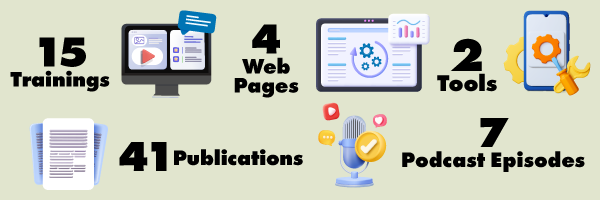
The REMS TA Center offers several resources that are applicable
to both K-12 and IHE practitioners. Site visitors may use
the new
Training Opportunities
web page to explore and learn
about all of the training modalities offered by the REMS TA Center. Another
new web page on
Interlocal and Mutual Aid Agreements
contains
interview responses from a K-12 subject matter expert and a higher ed
subject matter expert. The REMS TA Center’s new fact sheet
Donations and Volunteers: Managing Resources for Emergencies at Education Agencies
provides information on managing donations and volunteers as a part of
education agency emergency management. The REMS TA Center also updated the
EOP EVALUATE tool to review and refine your existing EOP and the
SITE ASSESS
tool to conduct a site assessment of your education agency’s buildings and grounds.
More publications for K-12 schools and school districts
are available from the REMS TA Center. We addressed threats such
as
protests and
hate speech and bullying in fact sheets, and highlighted
how schools can integrate
neurodivergent K-12 students and staff
into and collaborate with
faith-based organizations on EOPs. We also
released new sample annexes that provide a fictional example for before,
during, and after a school emergency on functions such as
accounting for all persons,
communications and warning,
and
continuity of operations. The
Emergency Exercises Training Package now contains a new tabletop
exercise on
human error. We also released more episodes on the
REMS on the Air Podcast on topics such as human error, behavioral
threat assessment, and emergency preparedness for afterschool programs.
|

